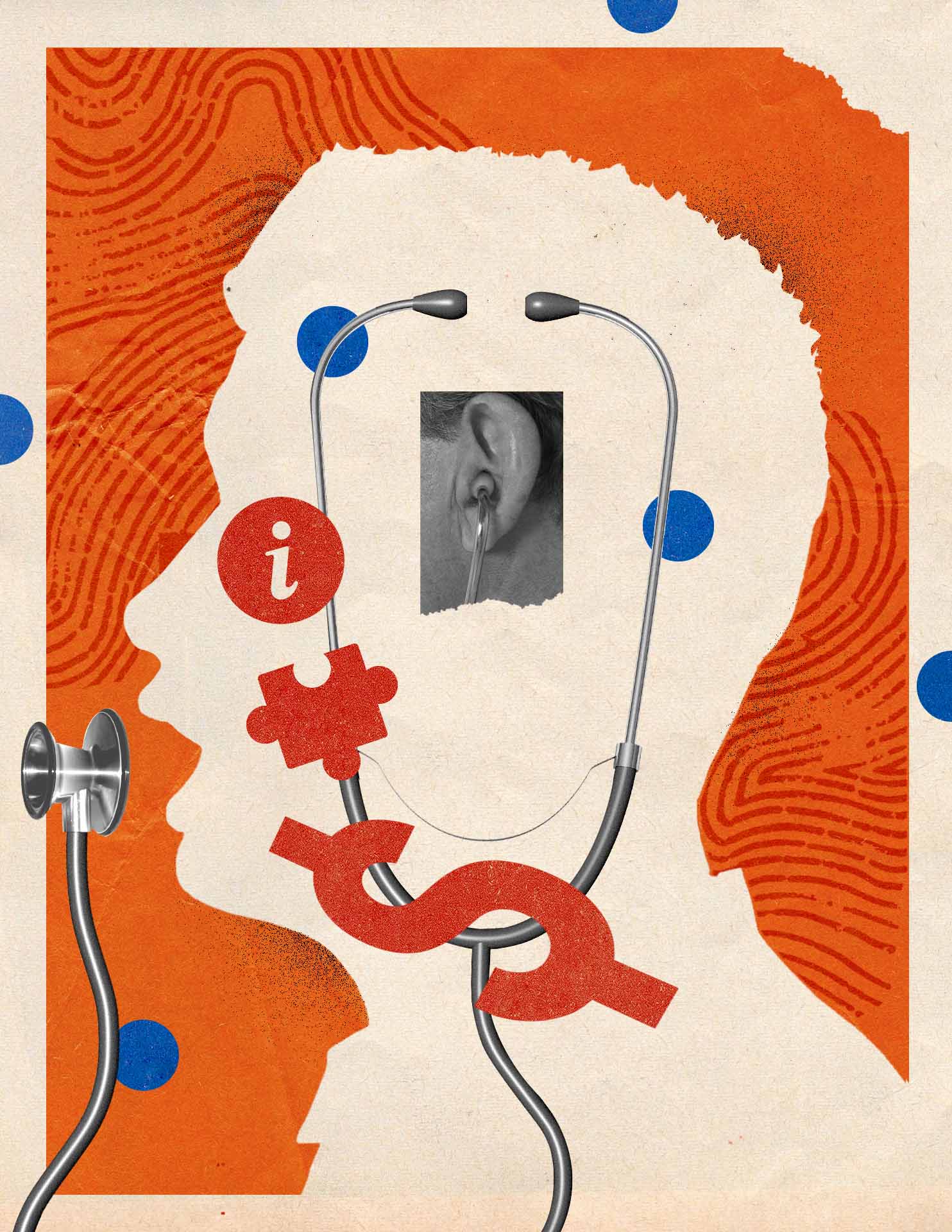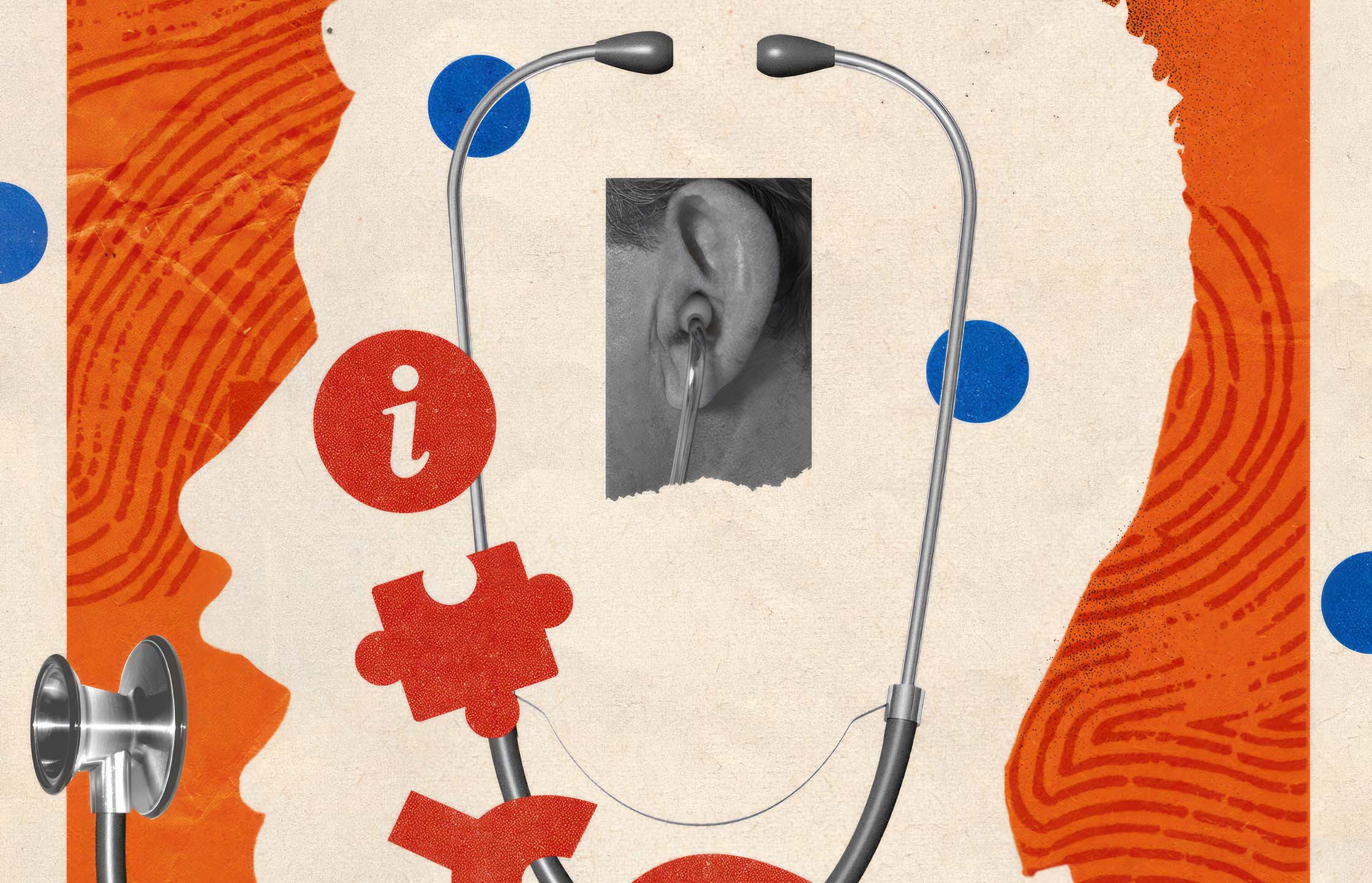A Show of Support
New research links unmet needs, racial disparities and clinical outcomes for cancer survivors
By Louis Greenstein
Illustration by Mark Harris

C
ancer patients with unmet supportive care needs are more likely to experience worse clinical outcomes, including more emergency department visits and hospitalizations, according to new research from Sylvester Comprehensive Cancer Center at the Miller School.
As reported in a paper published in June in the Journal of the American Medical Association, Sylvester researchers found that Black race, Hispanic ethnicity, and factors such as anxiety, depression, pain, poor physical function and low health-related quality of life scores were associated with a greater number of unmet needs, leading to increased risk for ED visits and hospitalizations. Unmet needs include financial, informational, psychological and physical challenges, but may vary across diagnoses.
“This is one of the first studies that assessed patients of diverse racial and ethnic backgrounds coming into a comprehensive cancer center for symptoms such as pain, fatigue, poor physical function, depression and anxiety,” said Frank J. Penedo, Ph.D., Sylvester’s associate director for Cancer Survivorship and Translational Behavioral Sciences and lead author of the JAMA article.
According to the American Cancer Society, advances in early detection and treatment have led to an increase in cancer survivorship. By 2032, there will be an estimated 22.5 million cancer survivors in the United States, a 24% increase over today. A recent systematic review found that up to 79% of survivors report at least one unmet need.
“Our findings support what we expected: that such unmet needs predict emergency room visits and hospitalizations,” said Dr. Penedo, who noted that researchers need to better understand the specific mechanisms and how the needs are related to clinical outcomes.
This retrospective analysis involved 5,236 patients treated at Sylvester’s various ambulatory cancer sites who used the My Wellness Check assessment, an electronic health record system that monitors patients’ emotional, physical and psychosocial needs. Patients are asked to complete the assessment 72 hours before most of their appointments. When a patient’s needs are identified, providers are notified in real time.
“Our findings offer strong evidence that unmet supportive care needs are associated with unfavorable clinical outcomes, particularly higher risk for ED visits and hospitalizations.”
The study’s results also suggest that efforts to address unmet needs should target specific populations. Hispanics comprised almost 48% of study patients, while other racial groups included Black people, Caucasians, Asians, American Indians, Native Alaskans, Native Hawaiians and other Pacific Islanders. Moreover, social constructs, limited resources for racial and ethnic minority populations, and racism are associated with disparate health outcomes.
Other key takeaways from the study included:
- 940, or 18%, of patients reported one or more unmet supportive care needs, with about one-third of them noting two or more unmet needs.
- Almost one-quarter of patients with unmet support needs had emergency department visits, compared with 14% for those without unmet needs.
- For hospitalizations, the differences were 23% and 14%, respectively.
- Support for coping with cancer and financial concerns were the most reported unmet needs, followed by general cancer education and information.
In previous Sylvester studies, researchers found that survivors who complete the My Wellness Check assessment reported fewer emergency room visits and hospitalizations. Its use can help physicians identify patients with unmet needs. That was the case for Juan Davila.
Following Davila’s 2018 diagnosis of advanced lymphoma and subsequent treatment, he realized that he was dealing with more than cancer. “After five years, I was completely broke,” said the 60-year-old former advertising executive from Coral Gables. “I had to sell my house.”
Throughout most of his treatment, Davila says he felt good.
“Even when I got sick, I never looked bad,” he said. “But there was some trauma that I wasn’t aware of.” Although he was insured, the out-of-pocket expenses and missed workdays took a toll. Eventually, he lost his job. He went from positive and energetic to stigmatized and depressed.
Davila’s responses to the MWC questionnaire picked up on his feelings and alerted his care team. But he was already aware. “I told my doctor, every time I do the wellness check, there is a section on mental health,” he said. “The more I fill it out, the more I realize my lack of motivation, my lack of ambition.”
Davila’s physician recommended a therapist with whom he could talk about his cancer experience.
“By nature, I like to follow instructions when it comes to my health,” Davila said. “I take my health seriously.” At first, the questionnaire felt to him like “another thing to fill out.” Multiple-choice questions, he said, can be annoying, “but I wanted to understand the data. I decided to partner with myself and take this seriously.”
The MWC assessment starts with simple questions such as, “Did you fall this week?”
“Then there is more when it comes to mental health,” Davila said. “I thought it was genius in the simplest of forms. You need to understand that cancer has a psychological impact on you whether you have the thickest skin or not.”
Today, things are looking up for Davila. He is in remission, living with his sister and working as an independent media consultant. He is also thinking about going back to school to jumpstart a writing career. “The reality,” he said, “is that I am alive, effervescently alive!”
The study extended the researchers’ work on the MWC assessment to show that when physical, emotional and practical needs are met, cancer survivors like Davila are less likely to visit the emergency room or be hospitalized.
“Our findings offer strong evidence that unmet supportive care needs are associated with unfavorable clinical outcomes, particularly higher risk for ED visits and hospitalizations,” Dr. Penedo said. “Addressing these unmet needs is crucial to improving clinical outcomes, particularly in racial and ethnic minority populations where the needs are greatest.” ![]()



